9 Healthiest Bagged Salad Kits—and 3 To Avoid
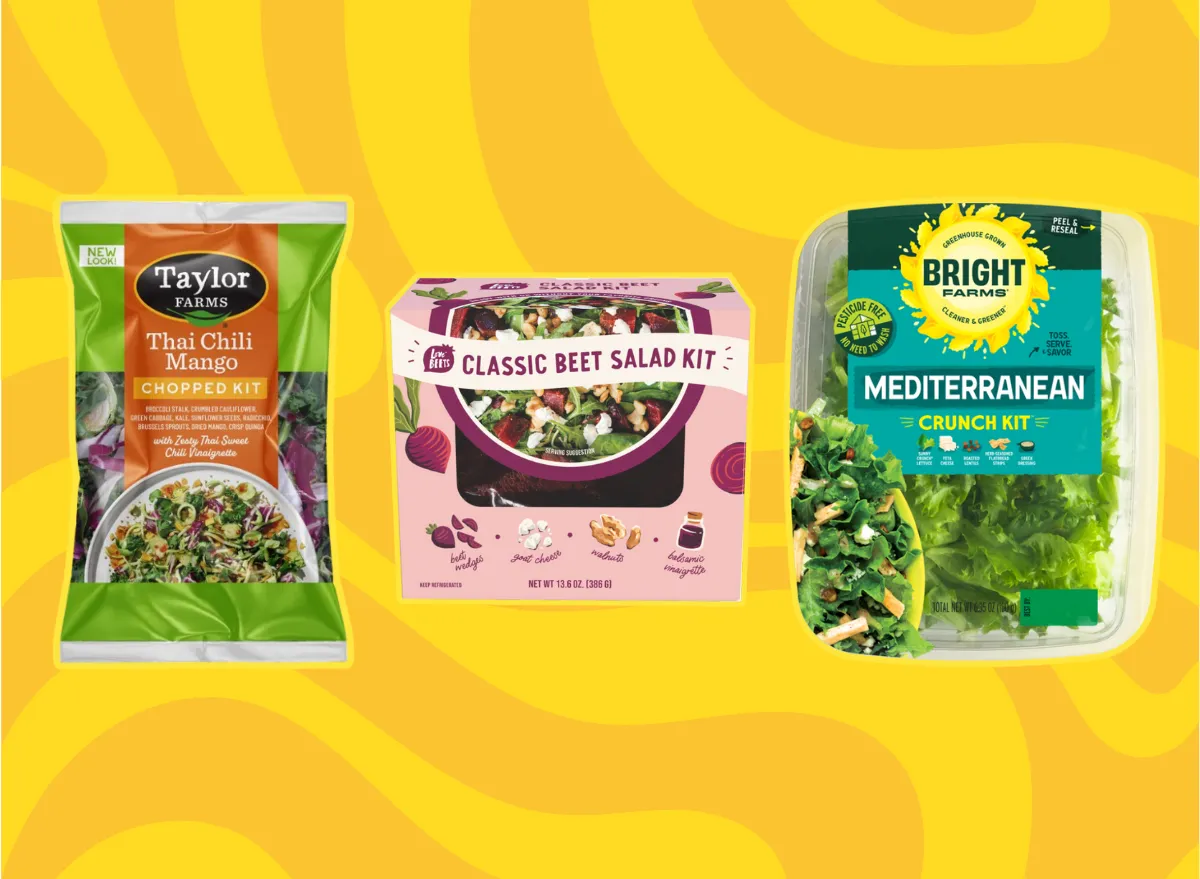
Before bagged salads, preparing a bowl of greens required a whole head of lettuce, a salad spinner, and time. It wasn't until 1976 that bagged salads hit grocery shelves, revolutionizing meal prep with pre-washed, fresh ingredients that are just as good (and often cheaper) than buying each ingredient individually.
However, bagged salads have earned somewhat of a bad rap in recent years. When these chopped salad kits were first introduced, companies loaded them with added sugars and sodium to make them taste better. (After all, there aren't many people who would choose a fresh salad over French fries.) But there's good news: With a growing focus on health, salad companies are now pivoting away from added sugar and sodium and towards kits with quality, satisfying ingredients like high-protein nuts, seeds, and even lentils.
To help you on your salad journey, we've rounded up nine of our favorite salad kits—and three that aren't so great—so you can get in and out of the grocery store with little to no fuss.
And even if you opt for a "not so great" salad choice, remember: any veggie intake is better than no veggies at all. There's no judgment if a sprinkle of bacon helps you get your greens in!
How we chose the healthiest bagged salad kits:
Choosing a bagged salad kit that fuels a healthy lifestyle can be complicated due to hard-to-find nutritionals and sugar-packed options on grocery store shelves. With three easy rules of thumb, you can choose the best bagged salad kit to fit your needs and fuel your family.
Remember that it's not the veggies that can make or break a bagged salad in the health-supporting department. It's the dressing and mix-ins that could make the difference.
We followed three main criteria while picking our "best" bagged salads:
- Low to no added sugars: Many bagged salads have added sugars, especially in dressings, to enhance flavor and entice customers. Sugar often compensates for lost flavor in kits with reduced sodium and fat levels. Check nutrition labels carefully as excess added sugar intake is linked to health issues like type-2 diabetes, cardiovascular disease, and fatty liver disease.
- Low sodium: Salad greens are naturally low in sodium, or contain no sodium at all, making dressings and toppings the primary sources of concern. Ingredients like ultra-processed meats, excessive cheese, and buttermilk-based dressings tend to contribute to high sodium levels. As excess sodium consumption can lead to cardiovascular disease, we've curated salads with lower sodium levels per serving and also suggested where to cut back on certain dressings if they do not healthily serve you.
- Free from ultra-processed meat: While bagged salad kits that include ultra-processed meats, such as bacon, add flavor and crunch, they also can cause the sodium, fat, and preservative levels to be higher than necessary. We opted for bacon-free options in our salad kits.
The 9 Best Healthy Bagged Salads
Best: Bright Farms Mediterranean Crunch Kit
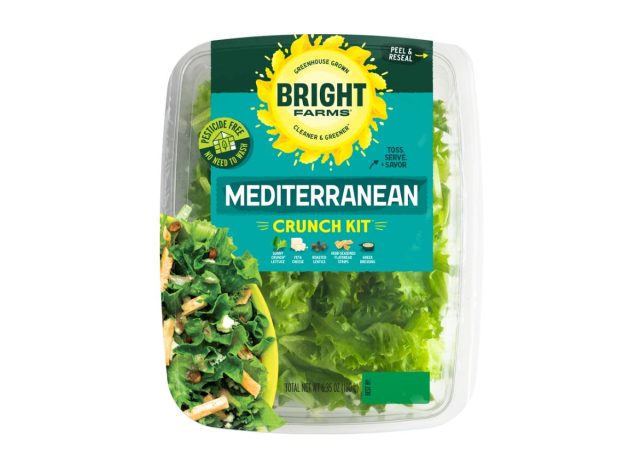
Calories: 350
Fat: 26 g (Saturated fat: 5 g)
Sodium: 780 mg
Carbs: 20 g (Fiber: 5 g, Sugar: 3 g)
Protein: 9 g
The Mediterranean diet is touted for its numerous health benefits, including boosted heart health and increased longevity, and is characterized by an emphasis on healthy fats such as olive oil and plant-based proteins including chickpeas and lentils. Bright Farms Mediterranean Crunch Kit includes heart-healthy ingredients such as feta cheese, roasted lentils, herbed flatbread, leafy greens, and a feta vinaigrette.
Bright Farms salads are all pesticide-free and greenhouse-grown. They source from local greenhouses to allow for shorter transit time (to help reduce our carbon footprint) and their packaging uses 35% less plastic than other similar packages.
Best: Taylor Farms Thai Chili Mango Chopped Kit
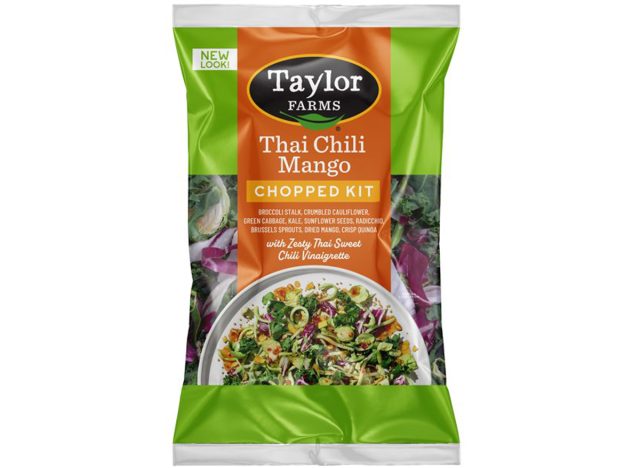
Calories: 150
Fat: 8 g (Saturated fat: 1 g)
Sodium: 250 mg
Carbs: 18 g (Fiber: 2 g, Sugar: 10 g)
Protein: 3 g
If you're looking for an easy, no-cook addition to your meal that is chock-full of nutrients, a bagged salad kit is perhaps your best bet in terms of both ease and nutritional density. Taylor Farms is one of the premier bagged salad companies with a wide variety of options to please the whole family. Their Thai Chili Mango Chopped Kit is a colorful smorgasbord that packs both sweetness and spice into every bite.
With a medley of veggies including cauliflower, Brussels sprouts, broccoli, radicchio, green cabbage, and kale, you'll also get sunflower seeds, dried mango, toasted quinoa, and their delicious Zesty Thai Sweet Chili Vinaigrette. This salad is "rainbow eating" at its finest.
Best: Josie's Organics Lemon Herb Salad Kit
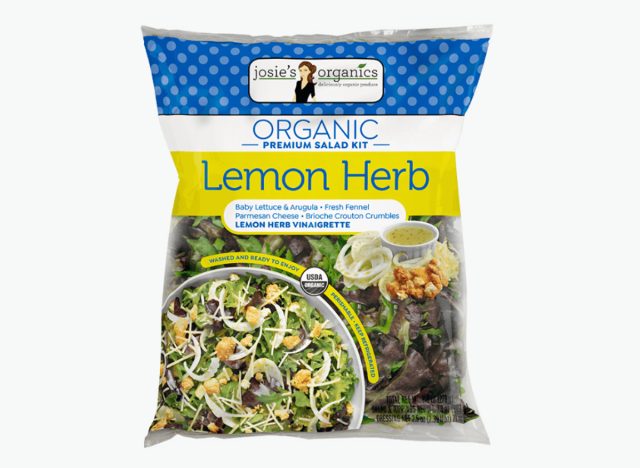
Calories: 120
Fat: 8 g (Saturated fat: 2 g)
Sodium: 280 mg
Carbs: 9 g (Fiber: 1 g, Sugar: 2 g)
Protein: 4 g
Josie's Organics, although a lesser-known brand, stands for quality ingredients and is 100% USDA-certified organic. The company's Lemon Herb Salad Kit includes ingredients such as fennel, arugula, tango lettuce (a red lettuce that's high in antioxidants such as beta-carotene), oak lettuce, and Lolla Rosa. Josie's Organics also boasts a three-pronged promise, advocating for the value of their employees, responsible farming practices, and overall sustainability. Additionally, their website offers a recycling guide on how to recycle their salad packages.
Gotham Greens Green Goddess Salad Kit
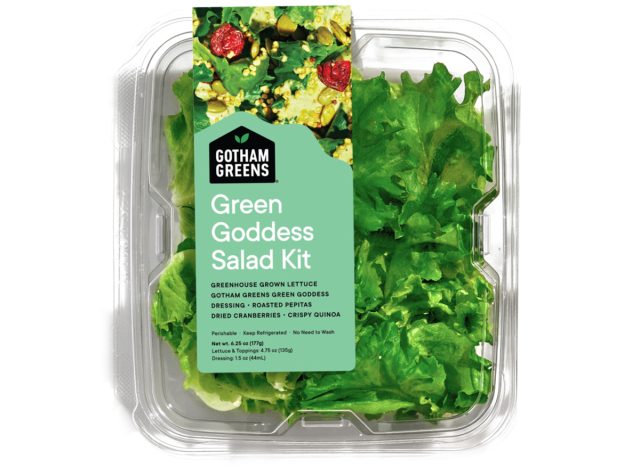
Calories: 320
Fat: 20 g (Saturated fat: 4.5 g)
Sodium: 390 mg
Carbs: 28 g (Fiber: 4 g, Sugar: 16 g)
Protein: 9 g
While this salad doesn't provide a balance of macros that scream "healthy", for some, it can be a great choice. Yes, it has saturated fat and a surprising amount of sodium and sugar, but it also provides 9 grams to help promote satiety. Plus, for non-salad lovers, something with a little more fat and sugar may help them include more veggies in their diet, which is a huge plus, since most Americans are not consuming enough produce every day.
These greens are pesticide-free, which is something all of us can feel good about.
Best: Love Beets Classic Beet Salad Kit
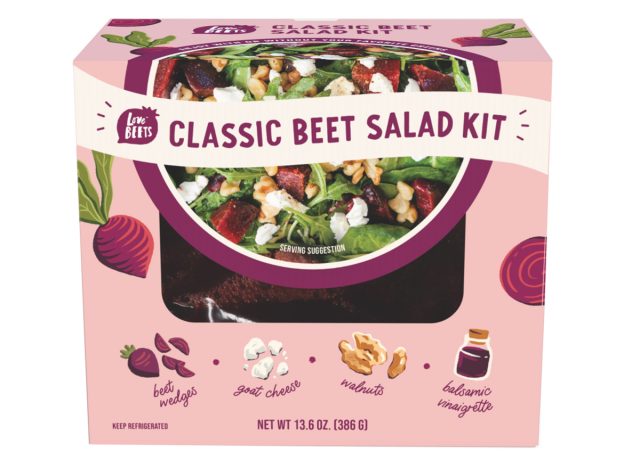
Calories: 120
Fat: 9 g (Saturated fat: 1.5 g)
Sodium: 120 mg
Carbs: 8 g (Fiber: 2 g, Sugar: 5 g)
Protein: 4 g
OK- this one is technically not a bagged salad, as you have to add your own greens. But we would be remiss to not include this one to our list, as beets are a powerhouse in the nutrition department.
With no added sugar, 4 grams of protein, and 2 grams of fiber per a mere ½ cup, this beet salad is packed with good-for-you compounds. This Love Beets Classic Beet Salad Kit combines beets—which are packed with nutrients such as folate (heart health) and manganese (metabolism, bone formation)—goat cheese, walnuts, and a relatively light balsamic vinaigrette compared to other options on the market.
Revol Organic Sesame Ginger Salad Kit
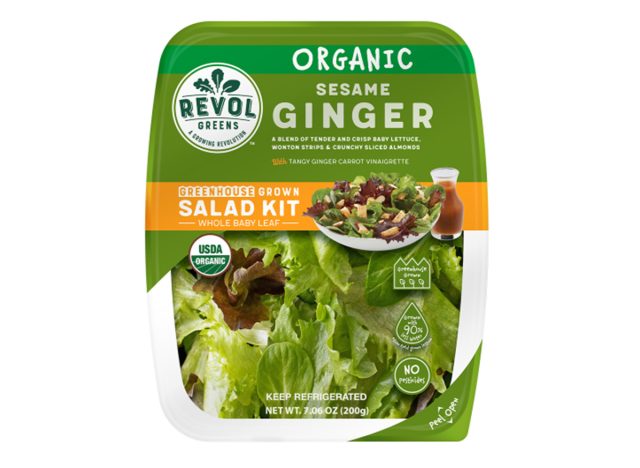
Calories: 160
Fat: 11 g (Saturated fat: 1.5 g)
Sodium: 302 mg
Carbs: 14 g (Fiber: 2 g, Sugar: 6 g)
Protein: 3 g
Revol's Organic Sesame Ginger Salad Kit is a good-for-you take on a delicious classic, providing 5% of your daily calcium needs as well as 9% of your daily iron needs, the latter of which is an imperative nutrient to stave off iron deficiency. Additionally, this salad provides 3 grams of protein with 2 grams of fiber to help promote satiety. As this salad does have slightly higher sodium counts than other brands, we recommend taking it easy on the dressing, adding lean meats or plant-based protein atop your greens, and drinking ample amounts of water throughout your day to stay hydrated.
All Revol Greens lettuce is grown inside a greenhouse and harvested daily, 365 days a year.
Cedar's Foods Taboule Salad
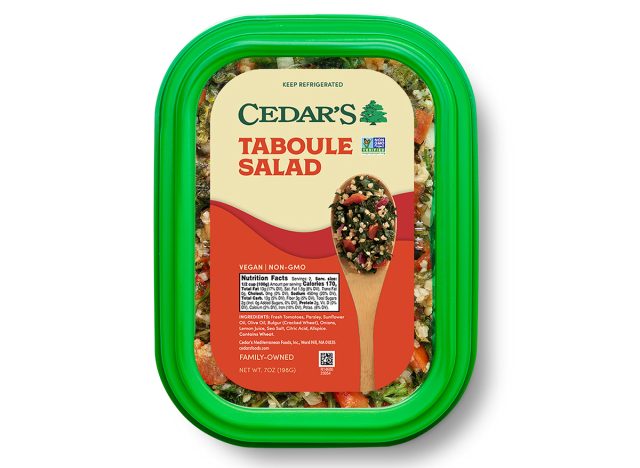
Calories: 170
Fat: 13 g (Saturated fat: 1.5 g)
Sodium: 450 mg
Carbs: 13 g (Fiber: 3 g, Sugar: 2 g)
Protein: 2 g
Salads don't have to be bland, and they certainly don't all look the same. Salads don't just have to be leafy greens, they can also be grain-based concoctions that provide ample nutrients, such as Cedar's Foods Taboule Salad. Made with straightforward ingredients such as fresh tomatoes, taboule, parsley, and olive oil, this is a great on-the-go option for vegans and meat eaters alike. This taboule salad also provides 10% of your daily iron needs as well as 6% of your daily potassium needs, the latter of which aids in balancing the nervous system.
Trader Joe's Veggies and Greens Salad Kit
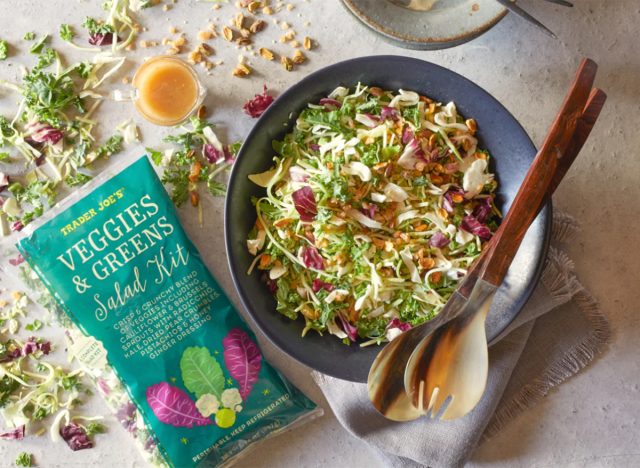
Calories: 120
Fat: 6 g (Saturated fat: 1 g)
Sodium: 200 mg
Carbs: 14 g (Fiber: 3 g, Sugar: 9 g)
Protein: 3 g
Trader Joe's is a go-to for many easy-to-make meals that require little to no cooking. Their bagged salads are no different, and their Veggies and Greens Salad Kit is no exception. Packed with chopped broccoli, cauliflower, Brussels sprouts, radicchio, green cabbage, and kale, you'll receive 4% of your daily calcium needs and 6% of both your iron and potassium needs. Additionally, this salad comes topped with multiple crunchy additions such as pistachios which are beneficial to heart health as they can help lower "bad" cholesterol levels.
Good & Gather Southwest Chopped Salad Kit
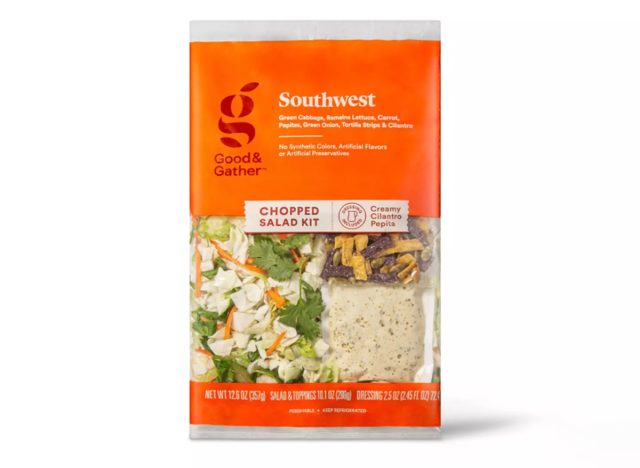
Calories: 150
Fat: 11 g (Saturated fat: 2 g)
Sodium: 160 mg
Carbs: 0 g (Fiber: 2 g, Sugar: 3 g)
Protein: 4 g
Target's Good & Gather Brand ranges widely from packaged snacks to bagged salad kits which, like their Southwest Chopped Salad Kit, stand as some of the healthier options on the market. With no added sugar and 4g of protein per 1 cup serving, this Southwest salad is a great alternative to other brands that sweeten their product with added sugars and intensify flavor with loads of sodium. Instead, this salad provides 4% of your daily calcium needs and 6% of both your iron and potassium needs. As a note, if you experience egg or dairy allergies, steer clear of the dressing on this salad.
The 3 Bagged Salad Kits To Avoid
Worst: Eat Smart Sweet Kale Salad Kit
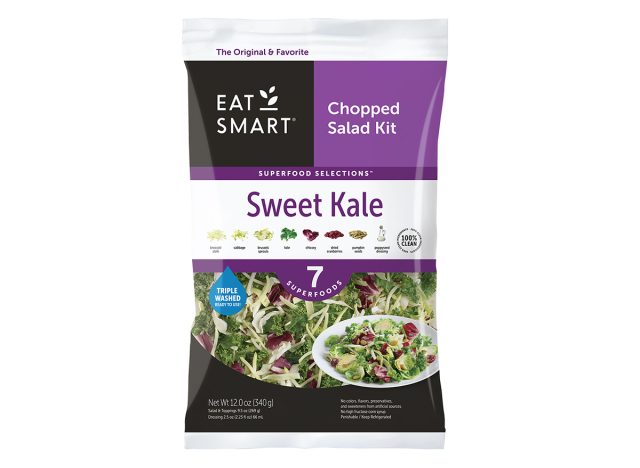
Calories: 170
Fat: 11 g (Saturated fat: 1.5 g)
Sodium: 160 mg
Carbs: 17 g (Fiber: 3 g, Sugar: 13 g)
Protein: 3 g
This choice may seem contradictory—how can anything with "kale" in the name be bad for you?—but the thing is, this salad itself isn't unhealthy as it's packed with greens such as kale, green cabbage, broccoli, and Brussels sprouts. The dressing, however, is a completely different story. The dressing constitutes 10g of added sugar which is approximately 20% of your daily recommended amount. Too much added sugar can lead to a slew of health concerns, including type 2 diabetes. So, if you do opt for this salad, we suggest swapping the dressing for a lighter choice, such as oil and vinegar straight from the pantry.
Worst: Fresh Express Bacon Caesar Salad Kit
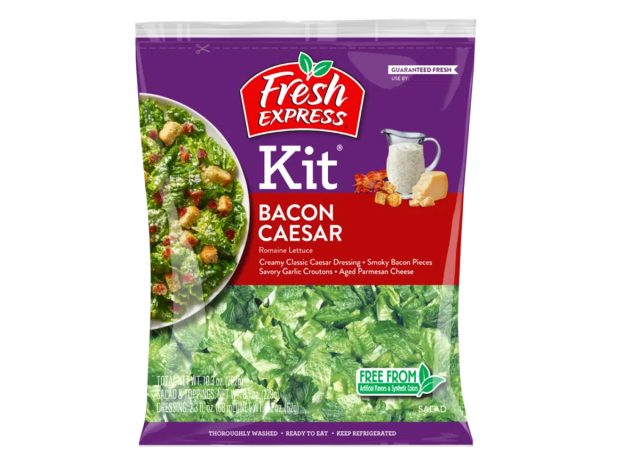
Calories: 160
Fat: 14 g (Saturated fat: 3 g)
Sodium: 310 mg
Carbs: 6 g (Fiber: 2 g, Sugar: 1 g)
Protein: 4 g
Perhaps it comes as no surprise that Fresh Express' Bacon Caesar Salad Kit makes our "worst" list. It's a well-known health fact that bacon isn't exactly the healthiest cut of meat out there, and processed meats have been shown to potentially increase your chances of developing certain cancers. There are many other options out there to help you achieve your protein consumption goals without any added risk such as leaner cuts of pork, chicken, or beef. This specific bagged salad also contains 310 milligrams of sodium per serving which is approximately 13% of your daily sodium needs. All in all, it may be best to avoid this particular salad. The good news is this brand has plenty of other choices out there.
Worst: Dole Cafe Style Chef Salad
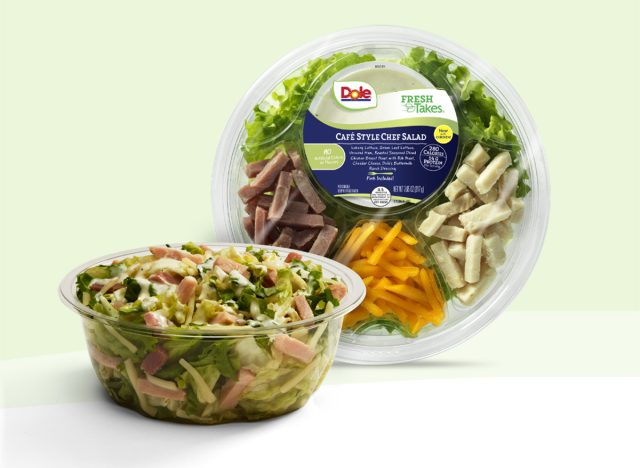
Calories: 280
Fat: 22 g (Saturated fat: 6 g)
Sodium: 650 mg
Carbs: 7 g (Fiber: 2 g, Sugar: 4 g)
Protein: 14 g
Although Dole's Cafe Style Chef Salad does provide ample protein—14 grams per serving—this salad does contain 650 milligrams of sodium. The American Heart Association recommends eating no more than 2,300 milligrams of sodium per day with an ultimate goal of 1,500 milligrams per day for the average healthy adult. You can get just as much protein by adding lean meats like chicken or even tofu or reduced sodium beans to your leafy greens while simultaneously shirking these egregious sodium counts.
If you do choose to eat this salad, which can be a healthy addition to an otherwise lower-sodium diet, just keep an eye on how much salt you are eating throughout the remainder of the day.
- Source: Guasch-Ferré, M., & Willett, W. C. (2021). The Mediterranean diet and health: a comprehensive overview. Journal of internal medicine, 290(3), 549–566. https://doi.org/10.1111/joim.13333
- Source: Blumfield, M., Mayr, H., De Vlieger, N., Abbott, K., Starck, C., Fayet-Moore, F., & Marshall, S. (2022). Should We 'Eat a Rainbow'? An Umbrella Review of the Health Effects of Colorful Bioactive Pigments in Fruits and Vegetables. Molecules (Basel, Switzerland), 27(13), 4061. https://doi.org/10.3390/molecules27134061
- Source: National Center for Biotechnology Information (2024). PubChem Compound Summary for CID 5280489, Beta-Carotene. Retrieved March 12, 2024 from https://pubchem.ncbi.nlm.nih.gov/compound/Beta-Carotene.
- Source: Khan KM, Jialal I. Folic Acid Deficiency. [Updated 2023 Jun 26]. In: StatPearls [Internet]. Treasure Island (FL): StatPearls Publishing; 2024 Jan-. Available from: https://www.ncbi.nlm.nih.gov/books/NBK535377/
- Source: Erikson, K. M., & Aschner, M. (2019). Manganese: Its Role in Disease and Health. Metal ions in life sciences, 19, /books/9783110527872/9783110527872-016/9783110527872-016.xml. https://doi.org/10.1515/9783110527872-016
- Source: Cheng, C. J., Kuo, E., & Huang, C. L. (2013). Extracellular potassium homeostasis: insights from hypokalemic periodic paralysis. Seminars in nephrology, 33(3), 237–247. https://doi.org/10.1016/j.semnephrol.2013.04.004
- Source: Gebauer, S. K., West, S. G., Kay, C. D., Alaupovic, P., Bagshaw, D., & Kris-Etherton, P. M. (2008). Effects of pistachios on cardiovascular disease risk factors and potential mechanisms of action: a dose-response study. The American journal of clinical nutrition, 88(3), 651–659. https://doi.org/10.1093/ajcn/88.3.651
- Source: Liu, Y., Cheng, J., Wan, L., & Chen, W. (2023). Associations between Total and Added Sugar Intake and Diabetes among Chinese Adults: The Role of Body Mass Index. Nutrients, 15(14), 3274. https://doi.org/10.3390/nu15143274
- Source: Farvid, M. S., Sidahmed, E., Spence, N. D., Mante Angua, K., Rosner, B. A., & Barnett, J. B. (2021). Consumption of red meat and processed meat and cancer incidence: a systematic review and meta-analysis of prospective studies. European journal of epidemiology, 36(9), 937–951. https://doi.org/10.1007/s10654-021-00741-9
- Source: How much sodium should I eat per day? (2024, January 5). www.heart.org. https://www.heart.org/en/healthy-living/healthy-eating/eat-smart/sodium/how-much-sodium-should-i-eat-per-day









